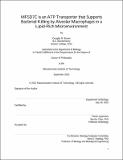MFSD7C is an ATP Transporter that Supports Bacterial Killing by Alveolar Macrophages in a Lipid-Rich Microenvironment
Author(s)
Brown, Douglas R.
DownloadThesis PDF (4.805Mb)
Advisor
Chen, Jianzhu
Terms of use
Metadata
Show full item recordAbstract
Major Facilitator Superfamily Domain-Containing 7C (MFSD7C) is a solute carrier with unknown substrate. In humans, mutations in MFSD7C cause Fowler syndrome, which is characterized by aberrant development of fetal vasculature in the brain resulting in hydranencephaly-hydrocephaly. Although most Fowler Syndrome patients do not survive past birth, those who do often experience recurrent respiratory infections. We now show that Mfsd7c-deficient alveolar macrophages in mice have an impaired ability to counter infection. This is demonstrated to be due to their altered metabolic state, characterized by heightened glycolysis and reduced lipid oxidation. When Mfsd7c-deficient alveolar macrophages encounter bacteria with glucose available as a nutrient, their deficiency in bacterial killing is abrogated. We then examine the purified protein MFSD7C and perform a candidate substrate screen using a thermostability-shift assay. We identify ATP as a putative substrate for MFSD7C and validate that 32P ATP can be absorbed by E. coli expressing the protein. We also determine that heme increases the rate of ATP uptake, prompting us to examine the effects of heme on ATP transport in alveolar macrophages. We find that heme rapidly and dramatically increases the rate of ATP export by Mfsd7c, providing insight into how this protein may modulate thermogenesis and metabolism as previously observed.
Date issued
2022-09Department
Massachusetts Institute of Technology. Department of BiologyPublisher
Massachusetts Institute of Technology